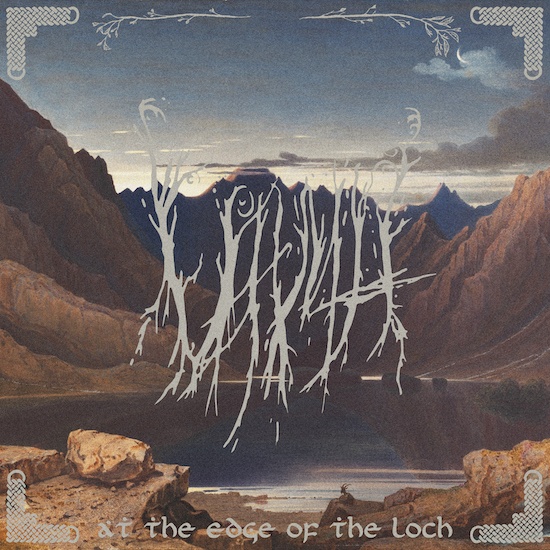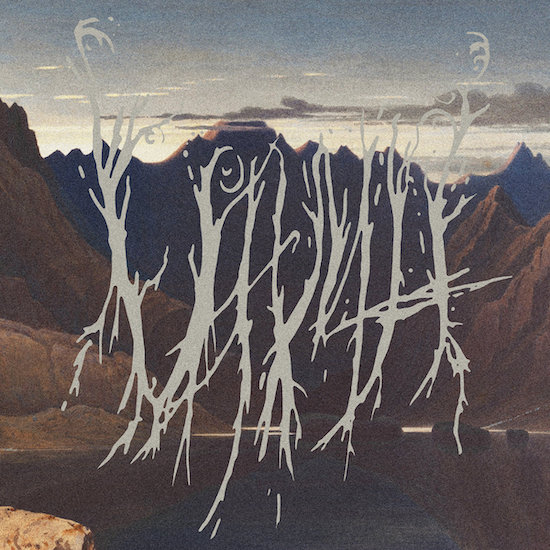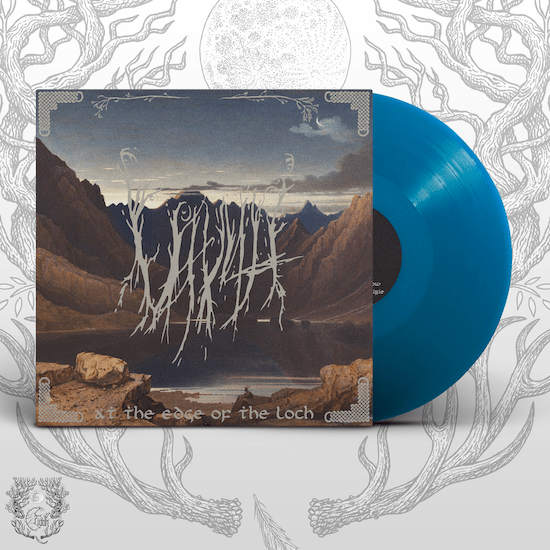
On July 7th, Fiadh Productions will (with considerable delight) release At the Edge of the Loch, the debut full-length by the Montana-based atmospheric black metal artist Uamh. As the album title itself suggests, Uamh‘s music draws inspiration from Celtic traditions, and subtly interweaves old folk instruments, along with drumming that sounds more stripped-down and even primitive than flashy (but still makes a visceral impact).
On the other hand, with one prominent exception, the vocals take the form of raw black metal screams, and the music, which derives its greatest strengths from the ravaging and ringing power of the carefully layered guitars, is capable of searing the senses and melting hearts as well as opening the mind’s eye to breathtaking panoramas.
We have a lot more thoughts about each of the album’s five compelling tracks, all of which we’re sharing with you today in advance of the album’s release this Friday, but we ought to begin the introduction with Uamh‘s own words:

“These pieces strive to make sense of our passage from life to death. As we walk our own paths we experience joy, sorrow, growth, and deterioration.
“As much as these works reflect the existential question of the paths’ end, they reflect the path between the beginning and the end far more. It is a reflection of gratefulness for each moment passed, finding courage in moments of despair, and a reflection of hope. The phrase, ‘At the edge of the loch’ defines a place and a moment in which we exist within peace and understanding.”
Although the album is musically multi-faceted, instrumentally diverse and with a power that continually surges and recedes, at least to these ears it has an overarching atmosphere, one that not only connects with the reflections that inspired it but also spawns visions of wilderness and the pleasures and perils of isolation, of conditions both harsh and wondrous and moods both introspective and lonely, as well as fiercely passionate. It’s also the kind of album that warrants the term “immersive”; it’s easy to fall into it and become swept away by the magic it conjures.
And if you’re looking for reference points here at the outset, names such as Panopticon and Saor come to mind….
(On a more practical and less poetic note, this is an album that really demands headphones. The channel-separation of the ingredients as Uamh steadily layers them in and moves among them is a vital part of what makes the music so immersive.)

The long album opener “Patches of Yarrow” begins in one ear and then catches the other one to create a grim harmony with rough whirring chords. Those sounds abrade like a harsh, dense, wind-driven sandstorm, and the impact is searing and distressing, made even more so by the intensity of the soul-baring screams. By contrast, the drum rhythm is less manic, a kind of booming and skipping progression, but it seizes attention in its own way.
Eventually the drums start racing, and the riffing becomes less of a sandstorm and more of a conflagration as shrill guitar leads pierce the ears in wild, roiling tones through the buzzing and swarming around them. When the drums suddenly vanish, the guitar and a talharpa manifest a dismal warbling wail, and a new distressing harmony unfolds across the channels around a staggering beat. The lead guitar adds another layer, once again piercing the ears and the mind, but in sounds of suffering and sorrow.
The ebb and flow of the music continue until a closing phase in which the channel-separated guitars ring out a lament that’s panoramic in its effect, with the crackle of a campfire as its companion.
“Clover of the Prairie” is a comparatively more compact song than the opener (though it still tops six minutes). The guitars still ring and sear, the vocals still scorch with shrieking intensity, and the drums slug and saunter again. But the mood of the music, this time embellished with leads that twang and twirl in inviting tones, is more wistful and wondering. To be sure, the moods are still clouded, and they become darker in a mid-song interlude. Afterward, the intensity surges and rushes, and as the riffing rises and falls, it seems to channel confusion and desperation. But that recurring lead-guitar melody is such an attention-grabber, and really gives the song a unique character.
A kind of high whistling sensation ties “Clover…” into “A’ Ghaoth,” the one flowing into the other, but “A’ Ghaoth” is a very different kind of song from what’s come before. It brings well-forward Uamh‘s Celtic music influences, with entrancing yet still impassioned folk singing (with Scottish or Irish roots) replacing the screams, backed by ethereal instrumentation that sounds like pipes burnished to a gleam.

“A’ Ghaoth” functions as a mesmerizing interlude in advance of the 15-minute “Seillean“. As you might expect from its length, it ebbs and flows like the tide. As it builds, the guitars slowly rake the senses with scarring reverberations over the drums’ widely spaced thumps, in a translation of loss and agony. Once again, the song benefits from channel separation, with the guitar in one wandering in gloom and the other seeming to cry out in piercing wails of yearning and pain. The drumming drives the intensity upward, beginning to hammer like a heart, with the guitars following in a brilliant blaze. (The bass murmurs, but even so, draws attention.)
In the middle, the tide recedes, and we slowly drift away on a shimmering synth-sea of sound, a haunting but engrossing digression. You know the tide will come in again, and it does, at first in a reprise of the song’s magnetizing opening phase (and there’s that bass again!), and then lifting the listener further up in an expansive, multi-layered guitar anthem that’s somehow both awe-inspiring and tragic. It’s the kind of crescendo that stays with you, even through the softer sounds that close the song.
“The Last Gate” closes the album with another ringing guitar anthem connected to what has come before it. Its soaring and sweeping scale, augmented again by the impassioned peal of the lead guitar, would get the heart pounding even without the pounding and galloping of the drums, the vibrancy of the bass, or the larynx-shredding vocals.
There is another drum-less mid-song diversion, which by now has become a hallmark of the songwriting, and this one proves to be just as spellbinding as the others, a few moments of self-reflection before the sonic and emotional storm breaks again, one last time.
Fiadh Productions will release the album on tape, along with a second tape that combines two previous Uamh EPs and an early single for people who might have missed those. Copies will also be available for EU/UK fans through Vita Detestabilis Records. And on top of that, Fiadh is making a big jump and releasing At the Edge of the Loch on vinyl, limited to 100 copies; pre-orders for those will become available on the July 7 release date.
For digital editions, Fiadh urges listeners to support the artist directly by getting those at Uamh‘s Bandcamp.
FIADH:
https://fiadh.bandcamp.com/album/at-the-edge-of-the-loch
https://www.instagram.com/fiadhproductions/
UAMH:
https://uamh.bandcamp.com/album/at-the-edge-of-the-loch
https://www.instagram.com/uamh.official
